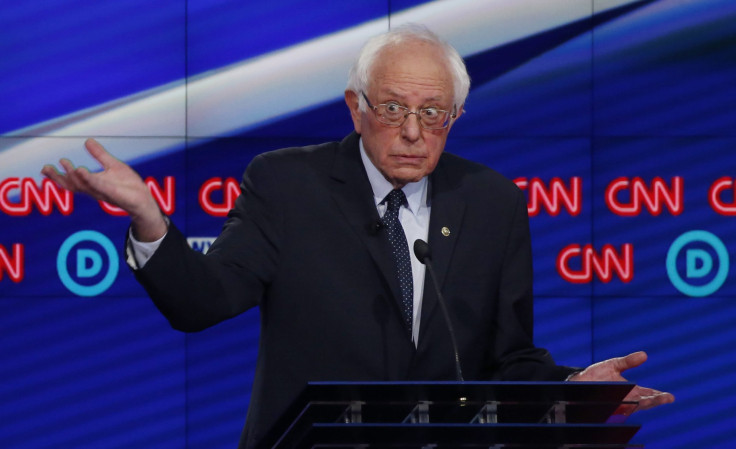Bernie Sanders Phenomenon Reflects A Generational Shift On Israel And Palestine

Sen. Bernie Sanders publicly disavowed Washington's unwavering embrace of Israel, saying the United States could no longer be "one-sided" in the conflict with Palestine. Not only that, but he also scolded Israel for a "disproportionate" response to attacks from Gaza and expressed sympathy for the Palestinian people during a presidential debate in New York — the most Jewish city in America. And a large portion of the audience seemed to love it.
“I believe the United States and the rest of the world have got to work together to help the Palestinian people. That does not make me anti-Israel," he said.
That's not a new position for Sanders, and he has never tried to keep his views a secret. Yet he has faced remarkable little pushback, particularly from the younger supporters who constitute his base, for his willingness to fault the Israeli government.
That may be in part because Sanders himself is Jewish, making him somewhat less vulnerable to accusations of anti-Semitism. But the openness to his views is largely because the politics of Israel are changing in the United States, particularly among younger Jews. A handful of well-funded pressure groups in Washington have helped secure broad political support for the Israeli government, but popular opinion has shifted under their feet.
A 2013 Pew survey found that 25 percent of American Jews between the ages of 18 and 29 think the United States is "too supportive of Israel," vs. 12 percent of those between the ages of 30 and 49. Among American Jews over the age of 50, just 6 percent think U.S. policy is too supportive.
Yet as the younger generation has entered the electorate, the two major parties have barely budged on Israel. Hillary Clinton illustrated as much during the debate when she referred to the 2000 Camp David Summit, then-President Bill Clinton's public attempt to negotiate an end to the Israel-Palestinian conflict.
The powerful interest groups haven't changed much either. They haven't had to. The American Israel Public Affairs Committee (AIPAC) has been remarkably successful at wooing American political elites in order to build support for the Israeli government; the group's annual lobbying expenditures have more than tripled since 2000, according to the Center for Responsive Politics.
At the same time, other Jewish groups have emerged as vocal counterweights. The Washington group J Street, founded in 2007, defines itself on its website as "the political home for pro-Israel, pro-peace Americans."
Sanders is the first Jewish presidential candidate to ever win a state primary held by one of the two major parties. In March, he also became the only current presidential candidate to skip AIPAC's annual conference instead of delivering a speech. Instead, his campaign circulated a copy of the speech he would have given, which included some mild criticism of the Israeli government.
Yet Sanders has also bowed to pressure elsewhere. On the day of the debate, his campaign suspended its Jewish outreach coordinator, Simone Zimmerman, after a conservative website published a Facebook post in which she said Israeli Prime Minister Benjamin Netanyahu had "sanctioned the murder of over 2,000 people this summer" in a reference to the recent Gaza War.
© Copyright IBTimes 2024. All rights reserved.












